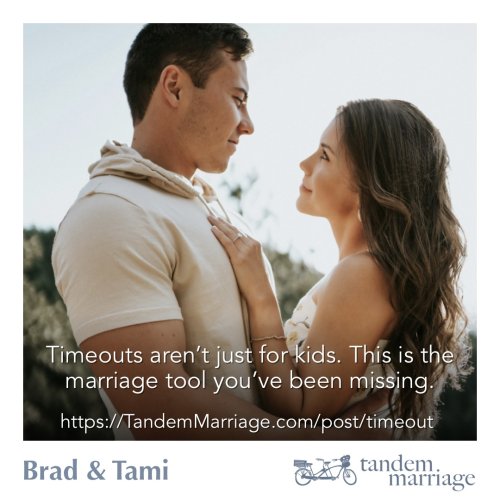Imagine a marriage in which neither you nor your spouse has any real issues: there is nothing you need to work on individually or as a couple, there are none of those awkward “rough edges” in your marriage that remind you both about the tension just beneath the surface, and you both agree on just about everything (with the rare exception being the color to paint the master bedroom). THAT marriage will never exist in your home, in your state, or on this planet. Never!
Having the aforementioned kind of “perfect” marriage is impossible, which is why Tami and I talk often about having a great marriage. Having a “great marriage” means that you are willing to take your imperfections, and those of your spouse, AND those that come from your unique mix together and decide daily and intentionally to work on things for the sake of something better than “just ok” in your marriage. Tami and I truly believe that if we can have a great marriage, everyone else is capable of doing the same. The two of us are two very different people from equally dysfunctional families that fell very much in love and refused to settle for “just ok.”
There are so many ways to have a great marriage, truly the ways that people find to have a great marriage cannot be counted. Nonetheless, there are some basics that you need to understand and have in your “great marriage” toolbox to get you off to a great start and to keep you there. For this article, I will list four essential tools for your “great marriage” toolbox. The first three are important, but it’s the last one that really ties them all together and gives your marriage the space to grow and thrive.
Common Worldview
A worldview is the lens through which you view the world. For some marriages, like ours, this means that we see life through the lens of a being made by a sovereign creator/God who has a purpose for our lives, both individually and together. Another example of a worldview could also be that you both feel passionate about human value and dignity which informs many of your decisions. While you can’t easily force a worldview on your spouse, you can work over time, to get your two worldviews closer to being in line with each other. This will require a great deal of love, grace, and patience to do so. Couples that are not intentional about this last point will end up with worldviews that are miles apart and wonder how it happened. When was the last time you sought to understand what your spouse's worldview is?
Ability to Resolve Conflict
As simple as this sounds, not everyone is capable of easily resolving conflict. This is a skill that is learned, over time, as you learn to manage your own emotions better and become intentional about slowing down and de-escalating conflict rather than escalating it. If you have trouble resolving conflict, please consider buying our book, Ready to Surrender. It is the most concise and well-tested way to learn this skill. We are very proud to offer this to you on our website at: https://TandemMarriage.com/youneedthis.
Common Passions
It is vital to have shared passions if a husband and a wife hope to share any common ground. Maybe you both love camping or travel in general. Maybe you love to host gatherings or spend time with friends. Maybe it’s bike riding that gets you both in your happy place. Whatever it is, there should be several things you love doing together. If not, this can be worked out over time as well. What are common passions between you and your spouse? Start with learning more about your spouse, then look for some common ground.
And this brings us to:
Work on Your Own Issues
As humans, we have a unique ability to use our senses to notice threats around us. The problems start when we begin to view our spouse as a threat by over-analyzing everything that they do or don’t do at the expense of missing what we, ourselves, are doing or not doing. This is a mistake that most spouses make at some point. The fix for all of this is to spend so much time working on your own issues, challenges, and struggles that you don’t have time to obsess over the issues, challenges, and struggles of your spouse. This is easier said than done and will take most spouses decades to work out.
IN SUMMARY
Every great marriage needs a common worldview, the ability to resolve conflict, common passions, and the motivation to work on your own issues. Do these reasonably well and you will find a great marriage right under your own roof!
DISCUSSION QUESTIONS:
1. In what ways do your worldviews share common ground?
2. What are some of your go-to ways to resolve conflict? Would your spouse agree that these are helpful?
3. What are some things that you and your spouse have in common? What do you both love to do?
4. How often do you assess the things in yourself that need some work? How regularly do you work on your own issues?
---
If you have any comments or questions about this post, we would love to hear from you.
By Brad & Tami Miller. Contact us at brad@TandemMarriage.com. Copyright © 2019
Link to: https://tandemmarriage.com/post/issues





